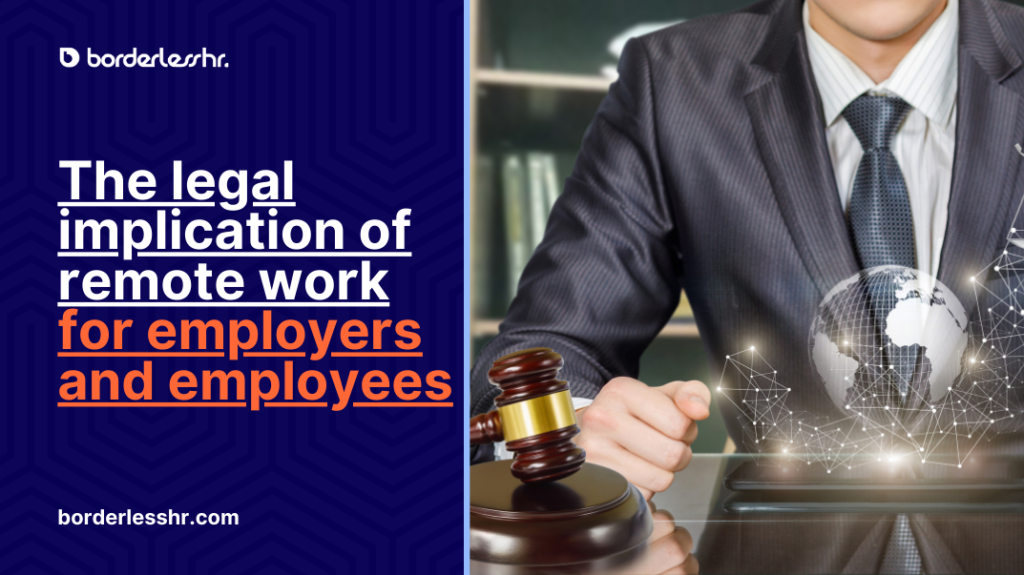As the world continues to adapt to the ongoing pandemic, remote work has become the new norm. While this shift has brought many benefits, it has also presented a unique set of legal challenges for both employers and employees. From ensuring compliance with labor laws to protecting sensitive information, navigating the legal landscape of remote work can be daunting. As a result, it’s essential to have a comprehensive understanding of the legal considerations surrounding remote work. In this article, we explore the key legal issues that arise in the context of remote work, including wage and hour laws, data protection regulations, and workers’ compensation. Whether you’re an employer or employee, this guide will provide you with the information you need to ensure that you are compliant with the law, protect your rights and interests, and navigate the legal landscape of remote work with confidence.
Legal considerations for employers
Employers have several legal considerations to keep in mind when it comes to remote work. One of the most critical issues is ensuring compliance with wage and hour laws. Under the Fair Labor Standards Act (FLSA), employers are required to pay non-exempt employees a minimum wage and overtime for hours worked over 40 in a workweek. However, tracking hours worked can be challenging in a remote work setting. Employers should establish clear policies and procedures for tracking and reporting hours, including requiring employees to log their time worked or using software to monitor work hours.
Another issue employers must consider is workers’ compensation. If an employee is injured while performing work-related duties, they may be entitled to workers’ compensation benefits. However, determining whether an injury is work-related can be more challenging in a remote work environment. Employers should establish clear policies and procedures for reporting work-related injuries and ensure that employees understand their rights and responsibilities.
Employers have a legal responsibility to provide a safe work environment for their employees. This responsibility extends to remote work environments. Employers must ensure that their remote workers have a safe work environment, including proper ergonomics and equipment, to prevent injuries that may occur while working remotely. Failure to provide a safe work environment for remote workers may result in legal action against the employer.
Employers are also responsible for providing workers’ compensation insurance coverage for remote workers. Workers’ compensation laws vary by state, but most states require employers to provide workers’ compensation coverage to employees, including those who work remotely. Employers who fail to provide workers’ compensation coverage for remote workers may face legal action.
Finally, employers must address data privacy concerns when employees work remotely. Employers should implement policies and procedures to protect sensitive information and establish protocols for responding to data breaches. It’s also critical to ensure that employees understand their responsibilities for protecting sensitive information and are trained on how to do so.
Legal considerations for employees
Employees also have legal considerations when it comes to remote work. One of the most important issues is ensuring that their employment contract addresses remote work. Employees should review their employment contract to determine whether it addresses remote work and whether any changes need to be made to the agreement to reflect the new work arrangement.
Another issue employees must consider is the tax implications of remote work. Depending on the state, employees may be subject to different tax laws, which can impact their tax liability. Employees should consult with a tax professional to determine their tax obligations and ensure that they are compliant with state and federal tax laws.
Employees who work remotely also have legal rights that employers must respect. Remote workers must be paid in compliance with state and federal labor laws, including minimum wage and overtime laws. Employers must also comply with laws that require them to provide remote workers with breaks and rest periods.
Remote workers also have the right to privacy. Employers must respect the privacy of remote workers and ensure that their personal information is protected. Employers must also comply with laws that require them to provide remote workers with access to their personnel files and other employment records.
Employees who work remotely may also be eligible for benefits, including health insurance, retirement benefits, and paid time off. Employers must comply with state and federal laws that require them to provide benefits to eligible employees.
Finally, employees must be aware of their rights to workers’ compensation benefits if they are injured while performing work-related duties. Employees should understand their employer’s policies and procedures for reporting work-related injuries and ensure that they report any injuries promptly.
Employment contracts and remote work
Employment contracts are critical when it comes to remote work. Employers and employees should review their employment contracts to ensure that they address remote work and establish clear policies and procedures for working remotely. The employment contract should address issues such as work hours, reporting requirements, communication protocols, and performance expectations.
Employment contracts should also address issues related to confidentiality and intellectual property. Employers should ensure that the employment contract includes provisions related to protecting sensitive information and intellectual property, including protocols for reporting breaches and addressing violations.
Tax implications of remote work
Remote work can have significant tax implications for both employers and employees. Employers should understand their obligations to withhold and remit state and federal taxes for remote employees. Employers should also be aware of state and local tax laws, which can vary significantly from state to state.
Employees who work remotely may be subject to different tax laws depending on the state in which they reside and the state in which they work. Employees should consult with a tax professional to determine their tax obligations and ensure that they are compliant with state and federal tax laws.
Workers’ compensation and remote work
Workers’ compensation is a critical issue for both employers and employees in the context of remote work. Employers should establish clear policies and procedures for reporting work-related injuries and ensure that employees understand their rights and responsibilities.
Employees who are injured while performing work-related duties may be entitled to workers’ compensation benefits. However, determining whether an injury is work-related can be more challenging in a remote work environment. Employees should understand their employer’s policies and procedures for reporting work-related injuries and ensure that they report any injuries promptly.
Intellectual property and remote work
Intellectual property is another critical issue for employers and employees in the context of remote work. Employers should establish clear policies and procedures for protecting intellectual property, including protocols for reporting breaches and addressing violations.
Employees should understand their responsibilities for protecting intellectual property and be trained on how to do so. It’s also essential for employees to understand their rights to intellectual property created during the course of their employment.
Data privacy and remote work
Data privacy is a significant concern for both employers and employees in the context of remote work. Employers should establish clear policies and procedures for protecting sensitive information and establish protocols for responding to data breaches.
Employees should understand their responsibilities for protecting sensitive information and be trained on how to do so. It’s also essential for employees to understand their rights to privacy and their employer’s obligations to protect their personal information.
International remote work considerations
International remote work presents a unique set of legal considerations for both employers and employees. Employers must ensure compliance with labor laws in the country where the employee is located, which can be challenging given the complexity of international labor laws.
Employees who work internationally may be subject to different tax laws and immigration requirements, which can impact their ability to work remotely. Employees should consult with a tax professional and immigration attorney to determine their obligations and ensure that they are compliant with all applicable laws.
Conclusion
In conclusion, remote work has transformed the traditional workplace and opened up new opportunities for both employers and employees. However, this new reality also brings with it a unique set of legal challenges that must be addressed to ensure compliance and prevent legal action.
Employers must be aware of their legal responsibilities, which include providing a safe work environment for remote workers, complying with tax laws and providing workers’ compensation coverage. They must also ensure that their remote workers receive the same rights and benefits as on-site workers, including privacy, minimum wage, and benefits.
On the other hand, remote employees must also understand their legal rights and obligations, which includes ensuring that they are classified correctly, receiving proper compensation, and being provided with a safe and secure work environment.
To navigate the legal landscape successfully, employers and employees need to understand the legal considerations surrounding remote work. This includes wage and hour laws, data protection regulations, and workers’ compensation. By following best practices and consulting with legal and tax professionals, both parties can navigate the legal landscape of remote work with confidence and ensure compliance with all applicable laws and regulations.
At BorderlessHR, we understand the complexities of remote work and provide a range of services to help businesses and individuals navigate the legal landscape successfully. Our team of experts can provide guidance and support on a range of issues, including legal compliance, data protection, and tax regulations. With BorderlessHR, you can navigate the legal complexities of remote work with ease and focus on what matters most – growing your business or advancing your career. Contact us today to learn more.







